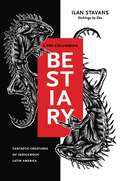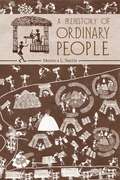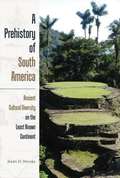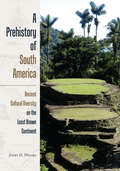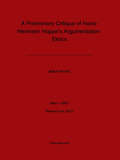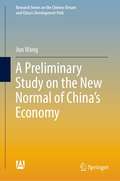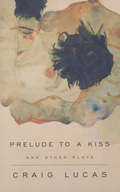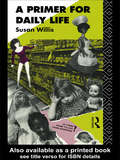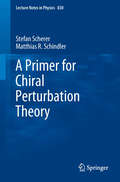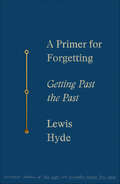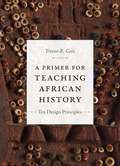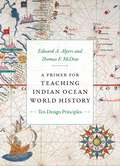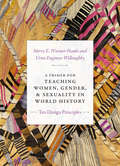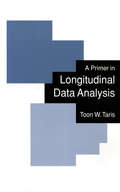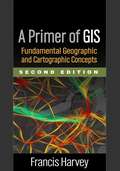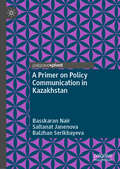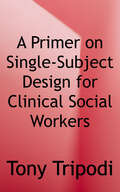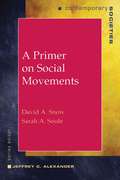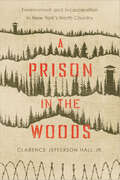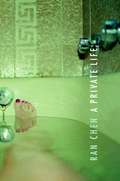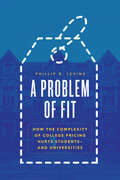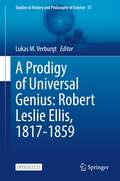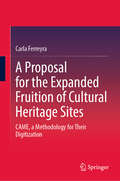- Table View
- List View
A Pre-Columbian Bestiary: Fantastic Creatures of Indigenous Latin America
by Ilan StavansAn encyclopedic collaboration between award-winning Mexican American scholar Ilan Stavans and illustrator Eko, A Pre-Columbian Bestiary features lively and informative descriptions of forty-six religious, mythical, and imaginary creatures from the Nahua, Aztec, Maya, Tabasco, Inca, Aymara, and other cultures of Latin America.From the siren-like Acuecuéyotl and the water animal Chaac to the class-conscious Oc and the god of light and darkness Xólotl, the magnificent entities in this volume belong to the same family of real and invented creatures imagined by Dante, Franz Kafka, C. S. Lewis, Jorge Luis Borges, Umberto Eco, and J. K. Rowling. They are mined from indigenous religious texts, like the Popol Vuh, and from chronicles, both real and fictional, of the Spanish conquest by Diego Durán, Bernal Díaz del Castillo, and Fernando de Zarzamora, among others. In this playful compilation, Stavans distills imagery from the work of magic realist masters such as Juan Rulfo and Gabriel García Márquez; from songs of protest in Mexico, Guatemala, and Peru; and from aboriginal beasts in Jewish, Muslim, European, British, and other traditions. In the spirit of imaginative invention, even the bibliography is a mixture of authentic and concocted material.An inspiring record of resistance and memory from a civilization whose superb pantheon of myths never ceases to amaze, A Pre-Columbian Bestiary will delight anyone interested in the history and culture of Latin America.
A Prehistory of Ordinary People
by Monica SmithFor the past million years, individuals have engaged in multitasking as they interact with the surrounding environment and with each other for the acquisition of daily necessities such as food and goods. Although culture is often perceived as a collective process, it is individual people who use language, experience illness, expend energy, perceive landscapes, and create memories. These processes were sustained at the individual and household level from the time of the earliest social groups to the beginnings of settled agricultural communities and the eventual development of complex societies in the form of chiefdoms, states, and empires.
A Prehistory of South America
by Jerry D. MooreA Prehistory of South America is an overview of the ancient and historic native cultures of the entire continent of South America based on the most recent archaeological investigations. This accessible, clearly written text is designed to engage undergraduate and begining graduate studens in anthropology. For more than 12,000 years, South American cultures ranged from mobile hunters and gatherers to rulers and residents of colossal cities. In the process, native South American societies made advancements in agriculture and economic systems and created great works of art-in pottery, textiles, precious metals, and stone-that still awe the modern eye. Organized in broad chronological periods, A Prehistory of South America explores these diverse human achievements, emphasizing the many adaptations of peoples from a continent-wide perspective. Moore examines the archaeologies of societies across South America, from the arid deserts of the Pacific coast and the frigid Andean highlands to the humid lowlands of the Amazon Basin and the fjords of Patagonia and beyond.Illustrated in full color and suitable for an educated general reader interested in the Precolumbian peoples of South America, A Prehistory of South America is a long overdue addition to the literature on South American archaeology.
A Prehistory of South America: Ancient Cultural Diversity on the Least Known Continent
by Jerry D. MooreA Prehistory of South America is an overview of the ancient and historic native cultures of the entire continent of South America based on the most recent archaeological investigations. This accessible, clearly written text is designed to engage undergraduate and beginning graduate students in anthropology. For more than 12,000 years, South American cultures ranged from mobile hunters and gatherers to rulers and residents of colossal cities. In the process, native South American societies made advancements in agriculture and economic systems and created great works of art—in pottery, textiles, precious metals, and stone—that still awe the modern eye. Organized in broad chronological periods, A Prehistory of South America explores these diverse human achievements, emphasizing the many adaptations of peoples from a continent-wide perspective. Moore examines the archaeologies of societies across South America, from the arid deserts of the Pacific coast and the frigid Andean highlands to the humid lowlands of the Amazon Basin and the fjords of Patagonia and beyond. Illustrated in full color and suitable for an educated general reader interested in the Precolumbian peoples of South America, A Prehistory of South America is a long overdue addition to the literature on South American archaeology.
A Preliminary Critique of Hans-Hermann Hoppe's Argumentation Ethics
by Adam KnottA critique of Hans-Hermann Hoppe's argumentation ethics from the point of view of Misesian praxeology.
A Preliminary Study on the New Normal of China's Economy (Research Series on the Chinese Dream and China’s Development Path)
by Jun WangThis book shows a panorama of sustainable development practices covering 70 major cities. This book has created the analysis framework of the “New Normal” of China’s economy, demonstrated the features and connotation of the "New Normal", carried out in-depth analysis and systematic study on the connotation and extension of the “New Normal” of China’s economy from ten aspects including growth shift, structural upgrading, innovation drive, regional synergy, moderate inflation, reform bonus, opening-up forced, risk exposure, sustainable development and macro-control in details and proposed targeted policy suggestions with practical application value that adapt to the new normal of China's economy and ensure the sustained, steady and healthy operation of the macro-economy.
A Prelude to a Kiss and Other Plays
by Craig LucasThis collection brings back into print one of Craig Lucas' best known and enduring works, A Prelude to a Kiss, which was both a hit on Broadway and a popular motion picture. Frank Rich in The New York Times wrote about Prelude, "It is rare to find a play so suffused with sorrow that sends one home so high." Also included are Missing Persons, "a truly intelligent play, one that is literary and heartfelt, beautifully written...a well-crafted, moving story, a dramatic rarity in these or any times "(New York Post), and Three Postcards, an offbeat and uniquely imaginative free form musical play.Craig Lucas is also the author of Reckless and Blue Window and What I Mean Was. He lives in Putnam Valley, New York.
A Primer For Daily Life (Studies in Culture and Communication)
by Susan WillisFirst published in 1991. Routledge is an imprint of Taylor & Francis, an informa company.
A Primer On Crime And Delinquency Theory
by Robert M. Bohm Brenda L. VogelThis slim volume offers a comprehensive survey of the major criminological and delinquency theories, including their philosophical foundations, policy implications, empirical support, and criticisms. A PRIMER ON CRIME AND DELINQUENCY THEORY can be used as a primary text or as a supplement for other texts, anthologies, or collections of journal articles.
A Primer for Chiral Perturbation Theory (Lecture Notes in Physics #830)
by Stefan Scherer Matthias R. SchindlerChiral Perturbation Theory, as effective field theory, is a commonly accepted and well established working tool, approximating quantum chromodynamics at energies well below typical hadron masses. This volume, based on a number of lectures and supplemented with additional material, provides a pedagogical introduction for graduate students and newcomers entering the field from related areas of nuclear and particle physics. Starting with the the Lagrangian of the strong interactions and general symmetry principles, the basic concepts of Chiral Perturbation Theory in the mesonic and baryonic sectors are developed. The application of these concepts is then illustrated with a number of examples. A large number of exercises (81, with complete solutions) are included to familiarize the reader with helpful calculational techniques.
A Primer for Forgetting: Getting Past the Past
by Lewis Hyde“One of our true superstars of nonfiction” (David Foster Wallace), Lewis Hyde offers a playful and inspiring defense of forgetfulness by exploring the healing effect it can have on the human psyche. We live in a culture that prizes memory—how much we can store, the quality of what’s preserved, how we might better document and retain the moments of our life while fighting off the nightmare of losing all that we have experienced. But what if forgetfulness were seen not as something to fear—be it in the form of illness or simple absentmindedness—but rather as a blessing, a balm, a path to peace and rebirth? A Primer for Forgetting is a remarkable experiment in scholarship, autobiography, and social criticism by the author of the classics The Gift and Trickster Makes This World. It forges a new vision of forgetfulness by assembling fragments of art and writing from the ancient world to the modern, weighing the potential boons forgetfulness might offer the present moment as a creative and political force. It also turns inward, using the author’s own life and memory as a canvas upon which to extol the virtues of a concept too long taken as an evil. Drawing material from Hesiod to Jorge Luis Borges to Elizabeth Bishop to Archbishop Desmond Tutu, from myths and legends to very real and recent traumas both personal and historical, A Primer for Forgetting is a unique and remarkable synthesis that only Lewis Hyde could have produced.
A Primer for Teaching African History: Ten Design Principles (Design Principles for Teaching History)
by Trevor R. GetzA Primer for Teaching African History is a guide for college and high school teachers who are teaching African history for the first time, for experienced teachers who want to reinvigorate their courses, for those who are training future teachers to prepare their own syllabi, and for teachers who want to incorporate African history into their world history courses. Trevor R. Getz offers design principles aimed at facilitating a classroom experience that will help students navigate new knowledge, historical skills, ethical development, and worldviews. He foregrounds the importance of acknowledging and addressing student preconceptions about Africa, challenging chronological approaches to history, exploring identity and geography as ways to access historical African perspectives, and investigating the potential to engage in questions of ethics that studying African history provides. In his discussions of setting goals, pedagogy, assessment, and syllabus design, Getz draws readers into the process of thinking consciously and strategically about designing courses on African history that will challenge students to think critically about Africa and the discipline of history.
A Primer for Teaching Indian Ocean World History: Ten Design Principles (Design Principles for Teaching History)
by Edward A. Alpers Thomas F. McDowA Primer for Teaching Indian Ocean World History is a guide for college and high school educators who are teaching Indian Ocean histories for the first time or who want to reinvigorate their courses. It can also serve those who are training future teachers to prepare their own syllabi, as well as those who want to incorporate Indian Ocean histories into their world history courses. Edward A. Alpers and Thomas F. McDow offer course design principles that will help students navigate topics ranging from empire, geography, slavery, and trade to mobility, disease, and the environment. In addition to exploring non-European sources and diverse historical methodologies, they discuss classroom pedagogy and provide curriculum possibilities that will help instructors at any level enrich and deepen standard approaches to world history. Alpers and McDow draw readers into strategically designing courses that will challenge students to think critically about a vast area with which many of them are almost entirely unfamiliar.
A Primer for Teaching Women, Gender, and Sexuality in World History: Ten Design Principles (Design Principles for Teaching History)
by Merry E. Wiesner-Hanks Urmi Engineer WilloughbyA Primer for Teaching Women, Gender, and Sexuality in World History is a guide for college and high school teachers who are teaching women, gender, and sexuality in history for the first time, for experienced teachers who want to reinvigorate their courses, for those who are training future teachers to prepare their own syllabi, and for teachers who want to incorporate these issues into their world history classes. Merry E. Wiesner-Hanks and Urmi Engineer Willoughby present possible course topics, themes, concepts, and approaches while offering practical advice on materials and strategies helpful for teaching courses from a global perspective in today's teaching environment for today's students. In their discussions of pedagogy, syllabus organization, fostering students' historical empathy, and connecting students with their community, Wiesner-Hanks and Willoughby draw readers into the process of strategically designing courses that will enable students to analyze gender and sexuality in history, whether their students are new to this process or hold powerful and personal commitments to the issues it raises.
A Primer in Longitudinal Data Analysis
by Toon W Taris`The author has done a remarkable job of writing a very accessible introduction to a broad literature. As such, he should be congratulated on achieving his objective to provide the "ideal primer for this growing area of social research"' - Kwantitatieve Methoden This accessible introduction to the theory and practice of longitudinal research takes the reader through the strengths and weaknesses of this kind of research, making clear: how to design a longitudinal study; how to collect data most effectively; how to make the best use of statistical techniques; and how to interpret results. Although the book provides a broad overview of the field, the focus is always on the practical issues arising out of longitudinal research. This book supplies the student with all that they need to get started and acts as a manual for dealing with opportunities and pitfalls. It is the ideal primer for this growing area of social research.
A Primer of GIS, Second Edition
by Francis HarveyThis accessible text prepares students to understand and work with geographic information systems (GIS), offering a detailed introduction to essential theories, concepts, and skills. The book is organized in four modular parts that can be used in any sequence in entry-level and more specialized courses. Basic cartographic principles are integrated with up-to-date discussions of GIS technologies and applications. Coverage includes everything from what geographic information is to its many uses and societal implications. Practical examples and exercises invite readers to explore the choices involved in producing reliable maps and other forms of geographic information. Illustrations include 170 figures (with 15 in color). The companion website provides links to Web resources for each chapter, plus downloadable PowerPoint slides of most of the figures. New to This Edition *Chapter on online mapping and Big Data. *New and updated discussions of remote sensing, vector and raster data models, location privacy, uses of geocoding, and other timely topics. *Chapter on the many uses of GIS, such as in market analyses, emergency responding, and tracking of epidemics. *Section overviews and an end-of-book glossary. Pedagogical Features *Modules and individual chapters can be used sequentially or in any order. *End-of-chapter review questions with answers, exercises, and extended exercises for applying theories and concepts. *"In-Depth" sidebars offering a closer look at key concepts and applications. *End-of-chapter links to relevant Web resources.
A Primer on Policy Communication in Kazakhstan
by Basskaran Nair Saltanat Janenova Balzhan SerikbayevaThis book is a timely publication to address the issue of the government’s policy execution capabilities. The crux of policy execution is communication to win the hearts and minds of the people, particularly with regard to complex policies. The book is written as a work manual based on international policy communication best practices and principles, interwoven with case studies from Kazakhstan, applicable in other Central Asian countries as well. The book’s wide range of topics cover media management in a technologically-savvy society, marketing of complexity, planning successful campaigns, soft power management given the country’s aspirations for greater international standing, and forward-looking advice on crisis management and shareholder communication. This is a highly relevant book for the civil service, civic organisations, commercial entities, policy researchers, and international organisations working in or planning to work in Kazakhstan and other Central Asian countries.
A Primer on Single-Subject Design for Clinical Social Workers
by Tony TripodiThe move to managed care in the human services has increased the popularity of single-subject design -- an adaptable methodology that is information based, outcome oriented, and consumer driven. <p><p>Special Features: Contains 39 tables and 55 figures; Demonstrates how clinicians can use the model to monitor treatment effectiveness; Promotes accountability in clinical practice.
A Primer on Social Movements (Contemporary Societies Series)
by Sarah A. Soule David A. SnowAward-winning sociologists David Snow and Sarah Soule draw from a broad range of theories including political sociology, theories of organizations, and the study of culture and social interaction to introduce the essential ideas for analyzing social movements.
A Prison in the Woods: Environment and Incarceration in New York's North Country (Environmental History of the Northeast)
by Clarence Jefferson HallSince the mid-nineteenth century, Americans have known the Adirondack Mountains of upstate New York as a site of industrial production, a place to heal from disease, and a sprawling outdoor playground that must be preserved in its wild state. Less well known, however, has been the area's role in hosting a network of state and federal prisons. A Prison in the Woods traces the planning, construction, and operation of penitentiaries in five Adirondack Park communities from the 1840s through the early 2000s to demonstrate that the histories of mass incarceration and environmental consciousness are interconnected. Clarence Jefferson Hall Jr. reveals that the introduction of correctional facilities—especially in the last three decades of the twentieth century—unearthed long-standing conflicts over the proper uses of Adirondack nature, particularly since these sites have contributed to deforestation, pollution, and habitat decline, even as they've provided jobs and spurred economic growth. Additionally, prison plans have challenged individuals' commitment to environmental protection, tested the strength of environmental regulations, endangered environmental and public health, and exposed tensions around race, class, place, and belonging in the isolated prison towns of America's largest state park.
A Private Life (Weatherhead Books on Asia)
by Ran ChenFrom one of China's most celebrated contemporary novelists comes this riveting tale of a young woman's emotional and sexual awakening. Set in the turbulent decades of the Cultural Revolution and the Tian'anmen Square incident, A Private Life exposes the complex and fantastical inner life of a young woman growing up during a time of intense social and political upheaval.At the age of twenty-six, Ni Niuniu has come to accept pain and loss. She has suffered the death of her mother and a close friend and neighbor, Mrs. Ho. She has long been estranged from her tyrannical father, while her boyfriend—a brilliant and handsome poet named Yin Nan—was forced to flee the country. She has survived a disturbing affair with a former teacher, a mental breakdown that left her in a mental institution for two years, and a stray bullet that tore through the flesh of her left leg. Now living in complete seclusion, Niuniu shuns a world that seems incapable of accepting her and instead spends her days wandering in vivid, dreamlike reveries where her fractured recollections and wild fantasies merge with her inescapable feelings of melancholy and loneliness. Yet this eccentric young woman—caught between the disappearing traditions of the past and a modernizing Beijing, a flood of memories and an unknowable future, her chosen solitude and her irrepressible longing—discovers strength and independence through writing, which transforms her flight from the hypocrisy of urban life into a journey of self-realization and rebirth. First published in 1996 to widespread critical acclaim, Chen Ran's controversial debut novel is a lyrical meditation on memory, sexuality, femininity, and the often arbitrary distinctions between madness and sanity, alienation and belonging, nature and society. As Chen leads the reader deep into the psyche of Ni Niuniu—into her innermost secrets and sexual desires—the borders separating narrator and protagonist, writer and subject dissolve, exposing the shared aspects of human existence that transcend geographical and cultural differences.
A Problem of Fit: How the Complexity of College Pricing Hurts Students—and Universities
by Phillip B. LevineA critical examination of the complex system of college pricing—how it works, how it fails, and how fixing it can help both students and universities. How much does it cost to attend college in the United States today? The answer is more complex than many realize. College websites advertise a sticker price, but uncovering the actual price—the one after incorporating financial aid—can be difficult for students and families. This inherent uncertainty leads some students to forgo applying to colleges that would be the best fit for them, or even not attend college at all. The result is that millions of promising young people may lose out on one of society’s greatest opportunities for social mobility. Colleges suffer too, losing prospective students and seeing lower enrollments and less socioeconomic diversity. If markets require prices to function well, then the American higher-education system—rife as it is with ambiguity in its pricing—amounts to a market failure. In A Problem of Fit, economist Phillip B. Levine explains why institutions charge the prices they do and discusses the role of financial aid systems in facilitating—and discouraging—access to college. Affordability issues are real, but price transparency is also part of the problem. As Levine makes clear, our conversations around affordability and free tuition miss a larger truth: that the opacity of our current college-financing systems is a primary driver of inequities in education and society. In a clear-eyed assessment of educational access and aid in a post-COVID-19 economy, A Problem of Fit offers a trenchant new argument for educational reforms that are well within reach.
A Prodigy of Universal Genius: Robert Leslie Ellis, 1817-1859 (Studies in History and Philosophy of Science #55)
by Lukas M. VerburgtThis open access book brings together for the first time all aspects of the tragic life and fascinating work of the polymath Robert Leslie Ellis (1817–1859), placing him at the heart of early-Victorian intellectual culture. Written by a diverse team of experts, the chapters in the book’s first part contain in-depth examinations of, among other things, Ellis’s family, education, Bacon scholarship and mathematical contributions. The second part consists of annotated transcriptions of a selection of Ellis’s diaries and correspondence. Taken together, A Prodigy of Universal Genius: Robert Leslie Ellis, 1817–1859 is a rich resource for historians of science, historians of mathematics and Victorian scholars alike. Robert Leslie Ellis was one of the most intriguing and wide-ranging intellectual figures of early Victorian Britain, his contributions ranging from advanced mathematical analysis to profound commentaries on philosophy and classics and a decisive role in the orientation of mid-nineteenth century scholarship. This very welcome collection offers both new and authoritative commentaries on the work, setting it in the context of the mathematical, philosophical and cultural milieux of the period, together with fascinating passages from the wealth of unpublished papers Ellis composed during his brief and brilliant career.- Simon Schaffer, Department of History and Philosophy of Science, University of Cambridge
A Promise And A Way Of Life: White Antiracist Activism
by Becky ThompsonThe first in-depth look at white people&’s activism in fighting racism during the past fifty years. Not since the Civil Rights Movement of the 1950s and 1960s, when many white college students went south to fight against Jim Crow laws, has white antiracist activity held the public&’s attention. Yet there have always been white people involved in fighting racism. In this passionate work, Becky Thompson looks at white Americans who have struggled against racism, offering examples of both successes and failures, inspirations, practical philosophies, and a way ahead.A Promise and a Way of Life weaves an account of the past half-century based on the life histories of thirty-nine people who have placed antiracist activism at the center of their lives. Through a rich and fascinating narrative that links individual experiences with social and political history, Thompson shows the ways, both public and personal, in which whites have opposed racism during several social movements: the Civil Rights and Black Power movements, multiracial feminism, the Central American peace movement, the struggle for antiracist education, and activism against the prison industry. Beginning with the diverse catalysts that started these activists on their journeys, this book demonstrates the contributions and limitations of white antiracism in key social justice movements.Through these stories, crucial questions are raised: Does antiracist work require a repudiation of one&’s whiteness or can that identity be transformed through political commitment and alliances? What do white people need to do to undermine white privilege? What would it take to build a multiracial movement in which white people are responsible for creating antiracist alliances while not co-opting people of color?Unique in its depth and thoroughness, A Promise and a Way of Life is essential for anyone currently fighting racism or wondering how to do so. Through its demonstration of the extraordinary personal and social transformations ordinary people can make, it provides a new paradigm for movement activity, one that will help to incite and guide future antiracist activism.
A Proposal for the Expanded Fruition of Cultural Heritage Sites: CAME, a Methodology for Their Digitization
by Carla FerreyraThis book presents a comprehensive methodology, integrating analysis, digitization, and the preservation of cultural heritage. It investigates three potential UNESCO World Heritage Sites, in Italy, Germany and South Africa, and employs a blend of documentary research and advanced digital surveying and data processing techniques. The volume shows how these efforts yielded actionable strategies to meet society's evolving demands for surveying, recovery, and conservation. The book documents the work behind the overarching objective which was to digitize, analyze, categorize, and store all collected data within a BIM framework, with the aim of streamlining collaboration, enhancing management efficiency, and optimizing processes. It demonstrates the utilization of digital tools in not only amplifying traditional scientific-technological approaches to heritage protection, but also its role in reshaping the perception, comprehension, and communication of heritage. This fosters the development of more sustainable conservation strategies.
